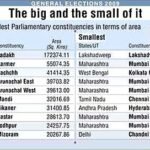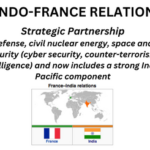Cabinet approval for Trade Facilitation Pact ratification

The Cabinet has approved a proposal for ratification of the Trade Facilitation Agreement (TFA) of World Trade Organization (WTO), aimed at easing customs rules for expediting global trade flow of goods. To facilitate domestic coordination and implementation of the TFA, the Cabinet meeting — chaired by Prime Minister Narendra Modi — also cleared the proposal to set up a National Committee on Trade Facilitation (NCTF) to be jointly chaired by the commerce and revenue secretaries. These objectives are also in consonance with India’s “Ease of Doing Business” initiative, according to an an official statement.
The WTO member-countries in November 2014 adopted a “protocol of amendment” to incorporate the TFA on goods in the overall WTO Agreement. The TFA also contains measures for effective cooperation between customs and other appropriate authorities on trade facilitation and customs compliance issues. For the TFA to be operational, two-thirds (or 108) of the 162 WTO members will have to ratify it. However, only 69 countries have ratified it so far.
BACKGROUND
The United Nations Conference on Trade and Development (UNCTAD) estimates that the average customs transaction involves 20–30 different parties, 40 documents, 200 data elements (30 of which are repeated at least 30 times) and the re-keying of 60–70 per cent of all data at least once.
With the lowering of tariffs across the globe, the cost of complying with customs formalities has been reported to exceed in many instances the cost of duties to be paid. In the modern business environment of just-in-time production and delivery, traders need fast and predictable release of goods.
For developing-country economies, inefficiencies in areas such as customs and transport can be roadblocks to their integration into the global economy and may severely impair export competitiveness or inflow of foreign direct investment. This is one of the reasons why developing-country exporters are increasingly interested in removing administrative barriers, particularly in other developing countries, which today account for 40 per cent of their trade in manufactured goods.
The WTO legal framework lacks specific provisions in some areas, particularly on customs procedures and documentation, and on transparency. The spectacular increase in the amount of goods traded worldwide in the last few years and the advances in technology and the computerization of business transactions have added a sense of urgency to the need to make the rules more uniform, user-friendly and efficient.
Due to these shortcomings as above discussed, The trade facilitation agreement (TFA), which is part of the WTO’s Bali ministerial package of 2013, contains provisions for expediting movement, release and clearance of goods, including goods in transit. It also sets out measures for effective cooperation between customs and other appropriate authorities on trade facilitation and customs compliance issues.
In line with the decision adopted in Bali, WTO members adopted on 27 November 2014 a Protocol of Amendment to insert the new Agreement into Annex 1A of the WTO Agreement. It further contains provisions for technical assistance and capacity building in this area.
The TFA measures, it is believed, would make the biggest impact in terms of reducing costs are:
Harmonization of documents
Streamlining of customs procedures (such as pre-arrival clearance)
Predictability in customs regulations (such as advance rulings on what tariffs apply to specific products or clear rules of procedure and availability of trade-related information).
KEY ISSUES IN WTO IN CONTEXT OF INDIA’S INTEREST
That includes finding a permanent solution to the issue of public stockholding for food security purposes and a mechanism to safeguard poor farmers from sudden import surge of farm products. India stockpiles food that is provided at a subsidized rate to two-thirds of its 1.2 billion people by procuring agricultural products from its resource-poor farmers at a price higher than the market under minimum support price (MSP).
Many of the developed member nations felt this may lead to over-production and eventually violate WTO trade rules. Nevertheless, it was agreed that food subsidy programs in developing countries will continue unchallenged until 2017, by which time a permanent decision should have been made.
The World Trade Organization (WTO) is the only global international organization dealing with the rules of trade between nations. At its heart are the WTO agreements, negotiated and signed by the bulk of the world’s trading nations and ratified in their parliaments. The goal is to help producers of goods and services, exporters, and importers conduct their business. It is an organization for trade opening. It is a forum for governments to negotiate trade agreements. It is a place for them to settle trade disputes. It operates a system of trade rules. Essentially, the WTO is a place where member governments try to sort out the trade problems they face with each other. Its headquarter is situated at Geneva, Switzerland and its current Director General is Roberto Azevedo. Afghanistan has become the 164th WTO member and the 36th least developed country (LDC) to join the global trade body.






0 Comments